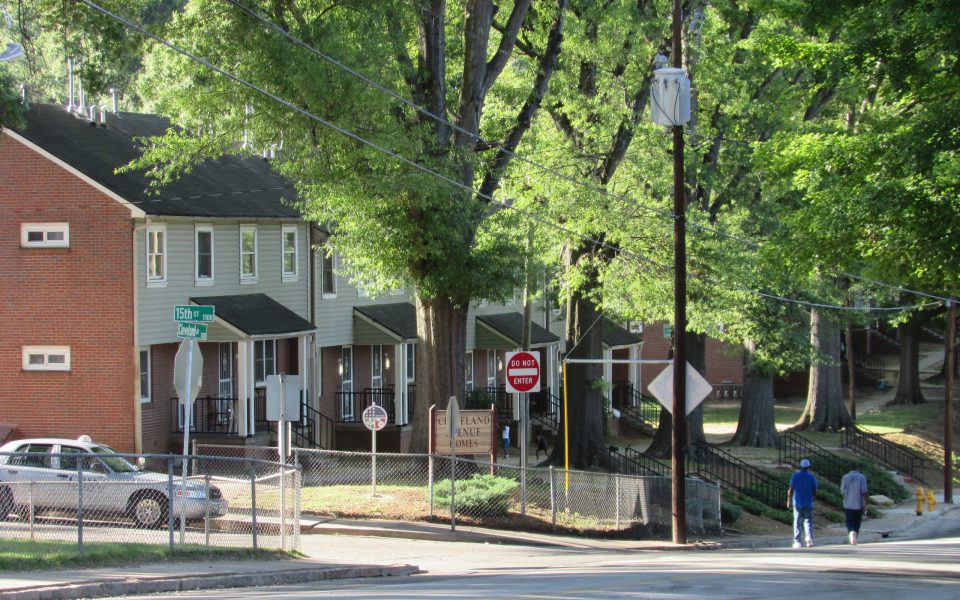The Housing Authority of Winston-Salem is applying for a federal grant that would allow it to tear down the Cleveland Avenue Homes public-housing community and replace it with mixed-income housing.
The Housing Authority of Winston-Salem is taking a second crack at a major federal grant to reshape the Cleveland Avenue area after getting turned down a year ago by the US Department of Housing & Urban Development.
The $30 million Choice Neighborhoods Implementation Grant, a successor to previous federal interventions like HOPE VI that are designed to revitalize poor areas, would be used to tear down the Cleveland Avenue Homes and replace the 1950s-era public housing community with mixed-income housing. Under the HOPE VI program, public housing projects in Happy Hills and Kimberley Park were similarly torn down and replaced with mixed-income housing.
“We believe that by tearing down public housing and going back to a different type of housing — not a hundred-percent rental and not a hundred percent concentrated poverty, but true mixed-income, mixed use of some homeownership, and some renters that we’ll begin to attract African Americans and other individuals that want to become first-time homebuyers, as well as individuals that are employed that will bring some economic leverage that will attract businesses,” Housing Authority CEO Larry Woods said.
The target area, which lies about 1.5 miles to the northeast of the booming Wake Forest Innovation Quarter, is saddled with 57-percent poverty and a median household income that is roughly a third of the average for the city.
Winston-Salem City Council voted unanimously on Monday to sign on as a co-applicant with the Housing Authority and to commit $3 million over a 6-year period for financing commercial development, business façade improvements, streetscaping and other initiatives. The city’s financial commitment helps the Housing Authority score points on its application. The application requires that the city’s financial contribution come from federal Community Development Block Grant, or CDBG funds. Council members noted that the financial commitment means the city will have less funding available for housing and other community development initiatives in other parts of the city. The $500,000 per year commitment is about a quarter of the city’s annual allocation of CDBG funds, Assistant City Manager Derwick Paige said.
Ironically, the US Department of Housing & Urban Development, or HUD, is requesting a $6 billion reduction in funding for Community Development Block Grants under Secretary Ben Carson.
Mayor Pro Tem Vivian Burke, whose ward includes the target area, lamented that residents are currently unwilling to patronize the Liberty Street Market, a nearby open-air pavilion, because the surrounding area is so challenged. She added that investment in neighborhood parks from the 2014 bond is also imperiled if the city doesn’t provide support for the transformation plan.
“Let your conscience think about that area if you had to live and sleep or even come and go in that area,” Burke said, “and then people not feeling good that even the children will have a decent place where they can even play in front of their yards.”
Burke said she’s constantly calling City Manager Lee Garrity and Housing Authority CEO Larry Woods to complain about “strange people coming in there who do not belong there,” which she characterized as “a disgrace and a shame.”
“Until we go in there and provide decent housing and provide a better choice, it will forever be a problem if we do not,” Burke said.
Woods said the grant would help the city address a worsening affordable housing deficit.
“The number of affordable units coming online seems to be very slow,” he said. “Market-rate housing is being built fast. We have plenty of housing for the wealthy. Where does the average individual that just wants to make a living live?”
While Woods wants to see professionals move into the Cleveland Avenue area and inject new buying power, he also wants janitors and security guards to be able to live in the Innovation Quarter to break down the economic segregation that divides the city.
Whether the grant brings people with higher incomes into the neighborhood or not, some level of displacement is inevitable. Since before the Housing Authority’s first attempt to land the grant in early 2017, Councilman Derwin Montgomery has insisted that the plan needs to include support for people who are forced to move. Woods has insisted that transitional services are covered in the project.
“One of the things that is on my heart and mind in reference to dealing with individuals — if this grant is awarded — is ensuring that the people who currently reside in the neighborhood and the community because this is a demolish-and-build-up type of plan, to ensure that people are cared for properly in the transition of where they have to move,” Montgomery said, “meaning that they have the proper services, they have the proper support, that they have what they need and they’re offered vouchers so that they’re able to move from one place to another, that they’re properly case-managed to truly have a stable moving point from one place to the next.”
Join the First Amendment Society, a membership that goes directly to funding TCB‘s newsroom.
We believe that reporting can save the world.
The TCB First Amendment Society recognizes the vital role of a free, unfettered press with a bundling of local experiences designed to build community, and unique engagements with our newsroom that will help you understand, and shape, local journalism’s critical role in uplifting the people in our cities.
All revenue goes directly into the newsroom as reporters’ salaries and freelance commissions.


Leave a Reply